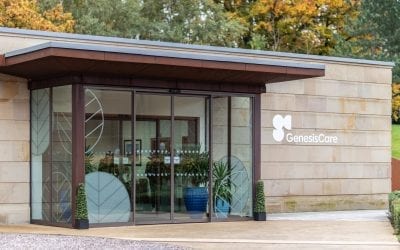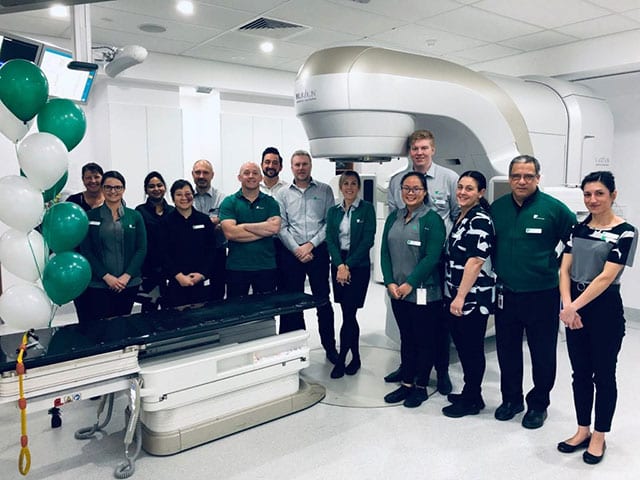- Patients
- Exploring care
- Conditions we treat
- Non-melanoma Cancer
Introduction
Non-melanoma skin cancer
Skin cancer is the most prevalent cancer type in the US. Each year, it is estimated there will be 5.4 million non-melanoma skin cancers (NMSCs) diagnosed in the US, with some people being diagnosed with more than one type of NMSC.
Despite the high occurrence of NMSC, almost all can be successfully treated. Unlike many other cancers, there’s a low risk of NMSC spreading to other parts of the body. This means early diagnosis and treatment can result in a positive outcome for most people.

What is NMSC?
Chapter 1
What is NMSC?
NMSCs are a group of skin cancers that develop in the upper layers of your skin. They can occur anywhere on the skin, though they’re most commonly found on parts of the body that have experienced long-term sun exposure – like the head, face, neck, arms, legs, and back of the hands. While ultraviolet radiation (UVR) through tanning and inadequate sun protection are the largest risk factors of developing NMSC, those at higher risk also typically have fair skin, a history of ionizing radiation (x-rays, gamma rays), a suppressed immune system or a history of skin cancer.
Although there are several types of NMSC, there are two main types: basal cell carcinoma (BCC) and squamous cell carcinoma (SCC). BCC makes up around 80% of all non-melanoma skin cancer cases whereas SCC is less common.
- Basal cell carcinomas (BCC) – Basal cell carcinoma begins in the basal cells of the skin, which are found at the bottom of the epidermis skin layer. BCCs typically remain in one place, but they can sometimes metastasize, or spread, to other nearby areas. In rare instances, they can spread to lymph nodes or other sites in the body. BCCs are the most common type of NMSC.
- Squamous cell carcinomas (SCC)– Squamous cell carcinoma develops in the squamous cells, which make up the middle and outer layers of the skin. Although they’re not usually life-threatening, some high-risk SCCs have the potential to metastasize to lymph nodes or distant sites in the body. Treatment may be less successful if other parts of the body have been affected.
Lack of sun protection is one of the highest risks of developing NMSC.
The most common risk factor of developing NMSC is ultraviolet radiation (UVR) through tanning and inadequate sun protection Those at higher risk also typically have fair skin, a history of ionizing radiation (x-rays, gamma rays), a suppressed immune system or a history of skin cancer.
There are several other known factors for skin cancer. Having a risk factor for a disease doesn’t mean that you will develop it, but it makes it more likely.
You’re more likely to develop skin cancer if you:
- Are older
- Have a family history or personal history of skin cancer
- Have a rare type of birthmark – known as giant congenital melanocytic naevus
- Spend lots of time in the sun
- Have fair skin which burns easily
- Have blonder or red hair, or blue or green eyes
- Have reduced immunity or HIV
- Have moles – the more moles you have, the higher the risk
- Have another medical condition – such as Chron’s disease, ulcerative colitis or sarcoidosis
- Have received an organ transplant
- A pink or red spot that doesn’t heal
- A scaly area of skin that doesn’t heal
- Smooth lumps with a pearly appearance
- Red or dark colored spots or sores that don’t go away after one month
- Red or dark colored spots or sores that are painful, itchy or bleeding
- Broken skin which doesn't improve within one month
- Red patches on your skin
Having one or more of these skin cancer symptoms doesn’t mean you have cancer, as they may be caused by other, benign (non-cancerous) conditions. It’s best to speak to your primary care physician for advice if you have any concerns.
Diagnostics
Chapter 2
Diagnostics
Typically, NMSC are associated with a mole or growth that changes in size, shape and color, a new growth on the skin, or a sore that does not heal. Your physician may want to run diagnostics if there is any concern of malignancy.
Following a physical examination, NMSCs are usually diagnosed by a biopsy. In some instances, a biopsy can remove all cancer tissue and no further treatment is required. If necessary, imaging scans such as CT and MRI may be used for a diagnosis. You may also have advanced diagnostic tests throughout treatment to assess effectiveness and how your cancer is responding.
Make an inquiry
Contact us today to find out how GenesisCare can help you.
Surgery
Chapter 3
Surgery
In many cases, surgery is performed for low-risk NMSC that are not in cosmetically sensitive areas. Our team of surgeons are specially trained and experienced in the removal of tumors containing cancerous and benign (non-cancerous) cells. There are different procedures used for skin cancer surgery and your surgeon will recommend the most appropriate one for you depending on what type of skin cancer you have and how advanced it is.
Cryosurgery (cryotherapy)
Cryosurgery uses extreme cold substances (usually liquid nitrogen or carbon dioxide) to freeze and destroy small BCCs and SCCs. This often performed by applying a cold gas on the tumor or placing a very cold probe against it. The cold substances freeze the tumor site and is frozen again after thawing. This may be repeated two or three times during the same treatment session with the goal of destroying the cancerous tissue.
Curettage and electrodesiccation
During this procedure, your surgeon removes the cancer by scraping away layers of cancer cells using an instrument with a circular blade, called a curette. Once this is complete, an electric needle is used to destroy any remaining cancer cells. The process is then often repeated once or twice during the same treatment session.
Excisional surgery
Excisional surgery involves cutting out the cancerous tissue and a surrounding margin of healthy skin. This procedure is performed under local anesthetic and the sample is looked at under a microscope after to ensure no cancer cells were left behind at the edges of the skin that was removed.
Mohs surgery
Mohs surgery, also known as Mohs micrographic surgery, is a technique that causes minimal damage to the surrounding healthy tissue and only removes the skin containing the cancer. The visible tumor is removed, and your surgeon will then remove a layer of the skin and analyze it to see if it contains any cancerous cells. This process is continued layer-by-layer until no more cancer cells are found.
Radiation therapy
Chapter 4
Radiation therapy
Radiation therapy is often most appropriate for NMSC where surgery is contraindicated, if the cancer is in a cosmetically sensitive area, or as an additional treatment for advanced disease. At GenesisCare, we specialize in advanced radiation therapy techniques, with treatment plans focused on minimizing side effects and putting your needs at the forefront.
Our latest-generation machines are built to deliver highly targeted radiation beams. The accuracy of these treatments, together with the expertise of our teams, means that we can often complete a course of radiation therapy in a shorter amount of time – so you can spend more time doing the things you love.
Our NMSC cancer treatments include external beam radiation therapy (EBRT), where radiation is delivered from outside the body, and internal radiation therapy (IRT), where the radiation dose is given via a source implanted within the body. The type of skin cancer treatment your radiation oncologist recommends will depend on your diagnosis, if the cancer has spread to other parts of your body, your general health and personal preferences.
Radiation therapy for non-melanoma skin cancer
Intensity-modulated radiation therapy (IMRT)
IMRT is an advanced external beam radiation therapy technique where the beams of radiation are precisely shaped to exactly match your tumor, which limits radiation exposure to adjacent healthy tissues.
Volumetric modulated arc therapy (VMAT)
VMAT is an advanced form of IMRT that directs beams of radiation in an arc across the treatment area. VMAT very accurately target areas of cancer and can be used to give a consistent dose to large treatment areas, while limiting radiation exposure to surrounding areas of the body.
High-dose rate (HDR) brachytherapy
HDR brachytherapy is an internal radiation therapy that delivers radioactive pellets to the tumor site through small plastic tubes called catheters or an implant. This is usually done in one session and is removed after 20 minutes.
Medical oncology
Chapter 5
Medical oncology
At GenesisCare, we offer a wide range of drug therapies and the latest anti-cancer drugs for skin cancer treatment, including chemotherapy, targeted therapy and immunotherapy.
Chemotherapy for NMSC
Chemotherapy refers to drugs that destroy cancer cells. Our expert teams may recommend chemotherapy before or after other treatments, or on its own. It can be applied as a cream directly onto the skin (topical chemotherapy), administered intravenously, or prescribed in the form of a tablet.
The type of chemotherapy you’ll receive will depend on how advanced your skin cancer is. If you have skin cancer that has spread to other parts of your body, chemotherapy may help control its growth, relieve symptoms and improve your skin cancer prognosis.
Red light treatment for NMSC
Red light treatment, or photodynamic therapy (PDT), is a type of chemotherapy. These drugs are activated by a light source such as a laser. When the light source is focused on the tumor, the drugs are triggered and kill the cancer cells. PDT is only used for early-stage skin cancer.
Targeted therapy for NMSC
Targeted therapy, also known as precision medicine, is a newer type of treatment that ‘targets’ cancer cells without affecting normal healthy cells. Targeted therapy seeks, attacks and blocks cellular activity that cancer depends on to survive and grow. Targeted therapies help determine what DNA mutation is driving a cancer, based off your individual genomic and genetic makeup. Types of targeted therapy for skin cancer include:
- Cancer growth inhibitors – some advanced or recurrent basal cell carcinomas have abnormal proteins that help the cancer grow. Cancer growth inhibitors target these proteins to shrink the tumor.
- EGFR inhibitors – squamous cell skin cancer cells can have too much of the EGFR protein which helps them grow. EGFR inhibitors target this protein and can shrink the cancer.
Immunotherapy for NMSC
Cancer cells rapidly divide out of control unlike normal, healthy cells, and often are able to hide from the immune system. Immunotherapy helps your body’s own immune system recognize and fight the cancer. Checkpoint inhibitors are an effective immunotherapy against advanced squamous cell carcinomas, blocking the signals that stop the immune system from attacking the cancerous cells.
Why choose GenesisCare
Chapter 6
Why choose GenesisCare
GenesisCare offers access to the latest technologies, advanced treatments and personalized care that’s tailored to the individual without delay.
Cancer care is constantly evolving, and we offer the world’s latest evidence-based treatments that have been shown to benefit patients. By working together closely, our multidisciplinary teams of oncologists, surgeons, radiation therapists and other healthcare specialists provide care that’s focused on you, not just your cancer, so you receive the best possible outcomes.
Our goal is to help you navigate through your cancer journey in the most positive way possible. That’s why as well as offering advanced and innovative treatment options, we also provide you with support and resources for your cancer journey - including advice about nutrition and exercise, expert help for managing side effects and information on local support groups.
Our centers are conveniently located throughout the United States, and each location has a dedicated Office Financial Counselor on hand to help you with your paperwork and answer your questions. We accept most insurance plans as well as Medicare Part B, which covers physician services, including radiation therapy.
References
- Skin Cancer Foundation. Skin Cancer Facts & Statistics. Available at: https://www.skincancer.org/skin-cancer-information/skin-cancer-facts/ [Accessed 01/17/2022]
- ASCO Cancer.Net. Skin Cancer (Non-Melanoma) Statistics. Available at: https://www.cancer.net/cancer-types/skin-cancer-non-melanoma/statistics [Accessed 01/17/2022]
Read next

Who we are
Across the world, we have more than 440 centers offering the latest treatments and technologies that have been proven to help patients achieve the best possible outcomes.

Our locations
With centers throughout the United States, you can get fast access to world-class, personalized healthcare close to home.

Working with us
Join a company with the mission to personalize global cancer care and improve patient outcomes.

News room - What's been happening
From new centers and technologies to the latest innovations in care, stay on top of what we are doing
